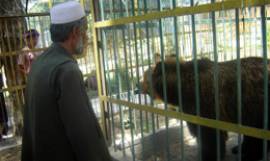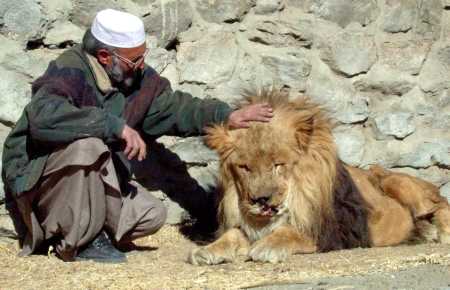The Killid Group, April 22, 2013
A zoo pays a high price for conflict
"Every time a rocket was fired the animals were traumatised," he recalls. "I never thought the great Kabul Zoo would be turned so soon into a ruin!" he adds thoughtfully.
By Noor Wali Saeed Shinwarai
Shah Barat was a zookeeper at the Kabul Zoo when Taleban fighters marched into the city. He did not flee like tens of thousands of people. He stayed on to look after the animals in the zoo. A testimony*
Before the Taleban took over the city in 1996, Kabul Zoo was home to 37 species. There was Marjan, the zoo's much-loved lion, an Indian elephant, deer, birds and many other animals.

Photo: The Killid Group
Taleban fighters killed some for food. A few more escaped and were never traced. The zoo, which was established in 1966, and counted as among Asia's best, was ravaged by war. That some of the animals survived was due to the dedication of zookeepers like Shah Barat.
"I suffered many hardships, hunger and danger but I did not let the animals in the zoo go hungry," he says. "They are also the creatures of God and goodness to them is counted as being good in the eyes of God. Unfortunately the hard hearted people turned their guns on these dumb creatures."
The young Shah Barat had sought employment in the zoo because of his love for animals from childhood. "I had a special sympathy for the animals in my village," he says. "I had kept many in the house. Villagers knew me as an animal lover. When I saw a sick dog, I would take care of it. Actually my house was a small zoo!"
Ruined by war
Kabul was far from his village in Andar district, Ghazni province, but Shah Barat was determined to work only in a zoo. In 1988, he joined the Kabul Zoo. Five years later at the time of the first major exodus of civilians from Kabul he was considered one of the senior zookeepers with many staff members fleeing the incessant bombing by rival mujahedin factions jockeying for control. The mujahedin had formed the government after toppling the communist Najibullah regime in 1992. But the power-sharing arrangement was short-lived, and between 1993 and 1996 when the Taleban took over Kabul, power continuously shifted from one faction to the other.
"Every time a rocket was fired the animals were traumatised," he recalls. "I never thought the great Kabul Zoo would be turned so soon into a ruin!" he adds thoughtfully.
Shah Barat says the civil war years were a time when people cowered in their houses from fear. The price of everything was sky high. Salaries were not paid on time, and when they were it wasn't enough for even a week. The zoo's keepers bought rations for the animals out of their own meager resources. "I kept my 10 children and wife hungry but the animals were never hungry," he says.
He speaks particularly warmly about his relationship with Marjan (which means coral in Dari and Arabic), the Kabul Zoo's only lion. Visitors thronged the zoo in the lull between the fighting. "Marjan was a gift from the Cologne Zoo. People came from all over the country to see him. He was our only source of income," he recalls.
The zoo's fortunes further dipped with the Taleban takeover of Kabul. The fighters showed no mercy for the animals. Groups of gunmen entered the zoo to tease and shoot.
Cruelty to animals
He remembers the day a gunman foolishly entered the lion's enclosure and was torn to pieces. The next day his friends returned and threw a grenade in Marjan's den. The unsuspecting lion was horribly maimed. "Marjan became blind in one eye. His jaw was full of shrapnel. He lost several teeth, which meant that he could not tear the meat he was fed. He couldn't smell. He lived for another 10 years but he was a pale shadow of his former regal self," he says.
He fondly remembers a monkey that was a gift from Nepal. She had become tame in the zoo and would even "eat her food with a spoon much to everyone's delight," he says. When the war broke out, and rockets rained from the sky, the caged animals were frantic with fear. "The war made her wild, and she escaped," he says of the monkey.
One day a bomb landed on the deer enclosure. "I ran towards the deer hut. All the deer were bathed in their blood. The whole hut was destroyed," he says. A rocket also killed the zoo's sole elephant.
After US troops drove out the Taleban in end-2001, the horrendous abuse of animals was widely reported. The one-eyed lion Marjan became world famous. Many zoos and organisations sent teams of experts to help rehabilitate the zoo. Marjan died in January 2002 of suspected liver and kidney failure.
Shah Barat, now 55, still works for Kabul Zoo, earning 6,000 Afs (roughly 110 USD).
* The testimonies of survivors of war crimes are our contribution to creating greater public awareness about people's hopes and claims for justice, reconciliation and peace. These testimonies and life stories are distributed internationally by the news agency IPS-Inter Press Service and are the basis for a radio drama that is being broadcast by seven Killid radios.
Characters Count: 5928

